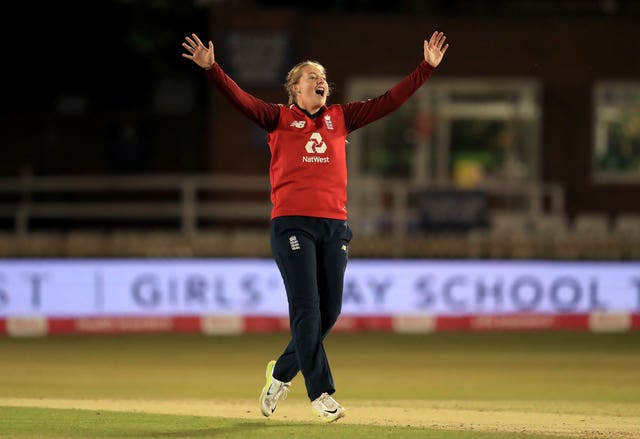England's Sophie Ecclestone hailed the decision to kick off the inaugural Hundred with a women's game as a "massive" moment for the sport.
The Kia Oval will host the opening game on July 21, with the Oval Invincibles taking on the Manchester Originals. It will be the first time a major UK team sporting event has headlined with a women's match.
Ecclestone will be part of the Manchester Originals squad in that first match, with the new format designed to attract a new cricket audience and appeal to younger viewers.
"I think it's massive that the women's games are going to be in the spotlight with the men," the 21-year-old told the PA news agency.
"It's going to be obviously a competition that's run with the men's and women's alongside each other so I think it's going to be massive for the women's game to go first and hopefully the Hundred will get a lot of publicity around it.
"It's really exciting to be playing in the first game of the Hundred, I think we're all really excited to get going in the Hundred and I think to play in that first game ever is going to be quite historic and it's going to be a great game.
"I'd love to bowl the first ball but I think with Kate Cross being the captain, and a seam bowler, I'm not sure I've got a choice really."

Ecclestone is no stranger to breaking down barriers having emerged as the world's number one international Twenty20 bowler in March, just before her 21st birthday.
The spinner also featured in the first edition of a women's Indian Premier League tournament, called the T20 Challenge, last year in the United Arab Emirates.
"It was a great experience for me to play in the IPL and I think it was just a great experience to be able to play as an overseas player," she said. "It would be great if it hopefully goes alongside the men's in the next few years – not just for women's cricket but for cricket in general."
* Ecclestone was speaking to the PA News Agency as part of an ECB initiative to help promote the new Dynamos Cricket programme, in which she and Chris Woakes visited their old primary schools to read out a letter they had written to the pupils.
/https%3A%2F%2Fsportsmole-media-prod.s3.gra.io.cloud.ovh.net%2F20%2F09%2Fsophie-ecclestone.jpg)
/https%3A%2F%2Fsportsmole-media-prod.s3.gra.io.cloud.ovh.net%2Fuploads%2F2025%2F11%2Fimago1069426574-6921890c1fa15979871066.jpg)
/https%3A%2F%2Fsportsmole-media-prod.s3.gra.io.cloud.ovh.net%2Fuploads%2F2025%2F11%2Fimago1069398963-69203b57b0924331078033.jpg)
/https%3A%2F%2Fsportsmole-media-prod.s3.gra.io.cloud.ovh.net%2Fuploads%2F2025%2F11%2Fjoe-root-691e64694f32a806526367.jpg)
/https%3A%2F%2Fsportsmole-media-prod.s3.gra.io.cloud.ovh.net%2Fuploads%2F2025%2F11%2Fsmith-691e5bc238211304088798.jpg)